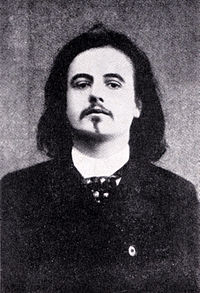Alfred Jarry
| Alfred Jarry | |
|---|---|
 |
|
| Born |
8 September 1873 Laval, Mayenne, France |
| Died | 1 November 1907 (aged 34) Paris, France |
| Occupation | Writer and dramatist |
| Nationality | French |
Alfred Jarry (French: [al.fʁɛd ʒa.ʁi]; 8 September 1873 – 1 November 1907) was a French symbolist writer who is best known for his play Ubu Roi (1896). He also coined the term and philosophical concept of 'pataphysics.
Jarry was born in Laval, Mayenne, France, and his mother was from Brittany. He was associated with the Symbolist movement. His play Ubu Roi (1896) is often cited as a forerunner of Dada, and to the Surrealist and Futurist movements of the 1920s and 1930. Jarry wrote in a variety of hybrid genres and styles, prefiguring the postmodern. He wrote plays, novels, poetry, essays and speculative journalism. His texts present us with pioneering work in the fields of absurdist literature and postmodern philosophy.
At the lycée in Rennes when he was 15, he led a group of boys who enjoyed poking fun at their well-meaning, but obese and incompetent physics teacher, a man named Hébert. Jarry and his classmate, Henri Morin, wrote a play they called Les Polonais and performed it with marionettes in the home of one of their friends. The main character, Père Heb, was a blunderer with a huge belly, three teeth (one of stone, one of iron and one of wood), a single, retractable ear and a misshapen body. In Jarry's later work Ubu Roi, Père Heb would develop into Ubu, one of the most monstrous and astonishing characters in French literature.
At 17 Jarry passed his baccalauréat and moved to Paris to prepare for admission to the École Normale Supérieure. Though he was not admitted, he soon gained attention for his original poems and prose-poems. A collection of his work, Les minutes de sable mémorial, was published in 1893.
...
Wikipedia
